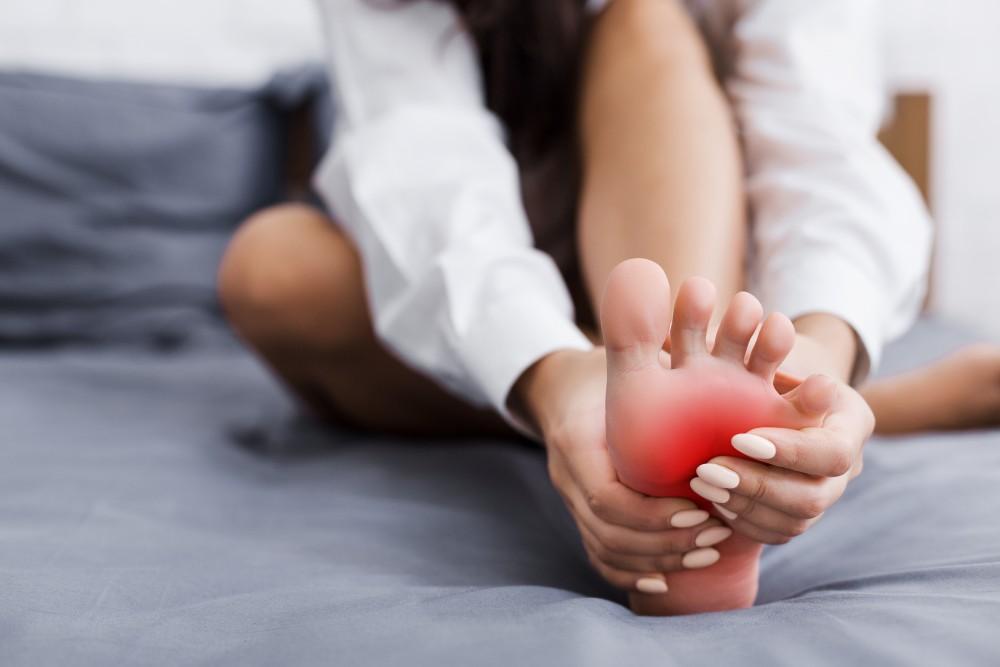
Flat Feet and Achilles Tendonitis: What’s the Connection?

If you have flat feet, you already know about dealing with pain in your arches, swelling, ankle and foot pain, and more. You might even have trouble getting around.
Unfortunately, there’s another condition that’s associated with flat feet that’s also painful and potentially life-limiting: Achilles tendonitis. This condition causes symptoms in the area of your Achilles tendon, which is the tissue band that connects your lower calf muscles to your heel bone.
There’s good news though. The talented and caring podiatry team at Premier Foot & Ankle provides advanced treatment for both of these conditions, as well as a multitude of other foot issues, from problems related to diabetes and bunions to foot and ankle injuries.
Your well-being and comfort are our top priorities, and at Premier Foot & Ankle, you’re always treated as a unique individual.
Understanding flat feet and Achilles tendonitis
We talked about the unpleasant symptoms flat feet can cause, though some of the estimated 18 million people living with flat feet (and an additional 8 million whose arches fall over time) are lucky enough to experience minimal or no symptoms.
You can be born with flat feet or your arches can fall in adulthood as a result of extra pounds and certain chronic health conditions like diabetes or rheumatoid arthritis. Still others develop flat feet as a result of repetitive movements at work, an injury, or engaging in certain activities, like running.
Achilles tendonitis is a condition where your Achilles tendon becomes severely inflamed, and some of the causes of this condition overlap with the causes of flat feet — such as running or working at a job where you’re required to stand all day.
Achilles tendonitis symptoms include:
- Stiffness or tenderness in your Achilles tendon area, especially after inactive periods
- Heel pain and pain along your Achilles tendon while walking or running
- Achilles tendon sensitivity when touched
- Noticeable swelling along your tendon or in your heel
- A warm sensation in the area
- Difficulty standing on your tip-toes
- Inability to put your full weight on one foot
You’re at higher risk of developing Achilles tendonitis if you’re male or live with certain medical conditions, such as high blood pressure and psoriasis.
Achilles tendonitis is also linked to taking a type of antibiotics called fluoroquinolones. And, unfortunately, just getting older can make it more likely that you’ll experience Achilles tendonitis symptoms.
The relationship between flat feet and Achilles tendonitis
In addition to the Achilles tendonitis risk factors we’ve noted, there’s a unique cause-and-effect relationship between having flat feet and developing Achilles tendonitis.
When you have flat feet, your lack of arches puts more intense strain on your Achilles tendon. Basically, your arches have more range of motion when they’ve fallen, and this causes your feet to slide inward (overpronation). Then, your Achilles tendons must work harder. In the process, they become inflamed and Achilles tendonitis develops.
Treatments for flat feet and Achilles tendonitis
Whether you suffer from flat feet or your flat feet have led to Achilles tendonitis, there’s good news. Premier Foot & Ankle offers effective treatments to provide relief for both conditions and get you moving comfortably again.
If you haven’t yet been diagnosed with Achilles tendonitis, your Premier Foot & Ankle podiatrist may recommend a device like custom orthotics, braces for your feet or ankles, or a fracture boot for your flat feet.
They may also prescribe nonsteroidal anti-inflammatory drugs (NSAIDs), physical therapy, oral steroid medications, or a change in the type of shoes you wear.
Sometimes a surgical solution is necessary if your flat feet progress to a severe rigidity or they become extremely arthritic.
If you do receive a diagnosis of Achilles tendonitis, it’s vital to get treatment so you don’t develop a more serious condition like a rupture of your Achilles tendon.
Your provider may advise custom orthotics treatment, NSAIDs, or physical therapy for your Achilles tendonitis — some of the same treatments recommended for flat feet.
Wearing night splints or heel lifts can also help, as can certain stretching exercises.
We offer innovative treatments as well, like extracorporeal pulse activation, or EPATⓇ therapy. This is a noninvasive, FDA-approved treatment that improves circulation, energizes your metabolism, and speeds up healing by helping damaged tissue regenerate.
Multiwave locked system laser (MLS) therapy hastens healing by encouraging cell turnover and reduces inflammation and scar formation. This treatment is popular with patients because it’s painless, FDA-cleared, and effective at addressing Achilles tendonitis pain and mobility problems.
Our wide range of treatment offerings helps you put your best foot forward and enjoy all the activities you love again — minus the pain.
To get started addressing your foot pain, contact one of our five convenient Texas locations to schedule an appointment. Call today or book online anytime.
You Might Also Enjoy...


Lapiplasty: How 3D Bunion Correction Works

How to Get to the Root of Your Chronic Heel Pain

5 Ways to Care for Your Athletic Feet This Year

How to Keep Toenail Fungus From Spreading


